September 11, 2001 changed everything. Doubly so for South Asians in America.
They faced ignorance. They faced bullying. They faced hate deep enough to kill.
But they also fought back and gained back lost ground.
The 9/11 anniversary in 2017 -- the first in President Donald J Trump's America -- however feels different.
Five Indian Americans who saw 9/11 and have had a front-row view to the community's battles since then share their thoughts with Rediff.com's Monali Sarkar.
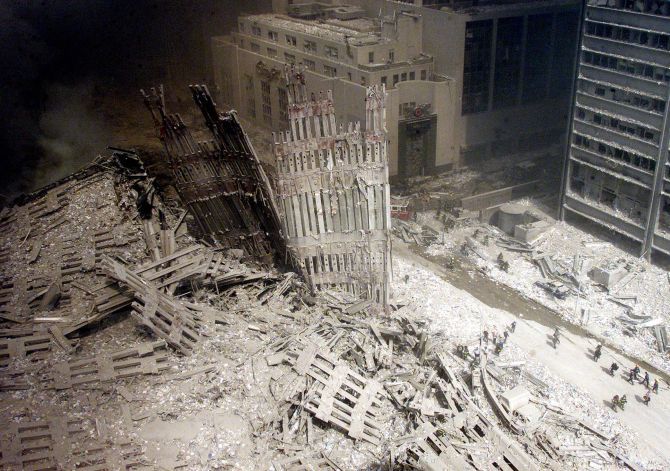
This is a photograph that no American will ever forget.
Photograph: Peter Morgan/Reuters
It is important to understand that this administration's clear Islamophobia and white supremacy is not an interruption to our national harmony or character.
The United States did not lose its innocence with the election of Donald Trump.
We are a country that enacted Japanese internment, that passed the Chinese Exclusion Act and Jim Crow, that created an economy around slavery that still echoes today and built monuments to a Confederacy still endorsed in many corners of our nation.
Under the Bush and Obama administrations, the National Security Entry-Exit Registration System opened cases on 83,000 Muslims entering or living in the United States. The result of this vast ethnic profiling was approximately zero terrorism-related convictions.
It is painful to see today that the level of hate violence aimed at South Asian, Muslim, Sikh, Hindu, and Arab American communities is nearing levels seen only the year after September 11, 2001.
But even this dismal reality does not mean we have only taken steps backward.
While the onslaught from our government continues and emboldens white supremacists to attack, our resistance has become stronger.
From showing up to airports to ensure that Muslim and refugee families could return home after the Muslim Ban was first announced to rallying in counter-protests after Charlottesville to supporting DREAMers in front of the White House, South Asian American communities have been at the forefront of resistance.
Moving forward, the lesson should be not waiting until our communities are the direct targets of devastating policies and violence, but continuing a steady drumbeat of resistance and movement building even when it seems like we are not directly impacted.
By brilliant example, last August the Movement for Black Lives released a historically comprehensive and inclusive policy platform that rooted the liberation of Black people in the freedom of Palestine, the end to all deportations, and unequivocal solidarity with all marginalised people.
This kind of movement, with the scope of its solution matching the scale of the problem, is the type we should all be working to build, together.
-- Lakshmi Sridaran is the director of National Policy and Advocacy, South Asian Americans Leading Together, a nonpartisan, non-profit civil rights organisation that elevates the voices of South Asians in the US.
Also by Lakshmi Sridaran: When the came for the Muslims, where were you?
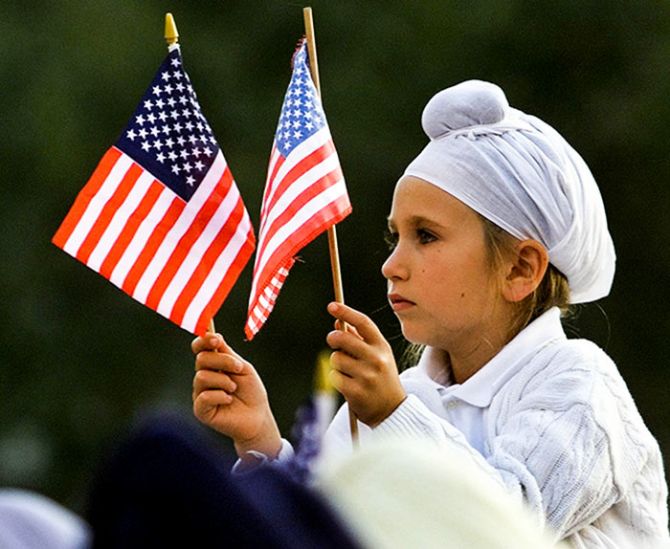
Photograph: Adrees Latif/Reuters
One of the issues that I devoted much of my time (3 years) while on on President Obama's Advisory Commission on Asian Americans and Pacific Islanders (AAPIs) was helping AAPI youth deal with the bullying and hate crimes that they were experiencing in school.
We created an anti-bullying campaign focused on AAPI youth called #ActToChange, which continues to exist outside of the White House today.
What was very clear to me was that educating young people about other cultures, finding ways to celebrate diversity and inclusion, and seeking solidarity with other groups were real ways in which we could combat the bullying that AAPI kids faced based on their culture, religion, appearance, immigration status, language proficiency and so forth.
Immediately following 9/11, we saw a breakdown of this very kind of cultural understanding.
We saw an uptick in severe hate crimes against people who were perceived to be anything like the terrorists who had attacked our country.
We saw insular thinking -- it's either you or me, and if you don't look like me, I don't want you here.
A lot of groups on the ground had to work very hard and devote many resources to promote cultural understanding and to find ways for communities to come back together.
Sadly, working on anti-bullying issues during the Obama administration, we would still hear resonances of 9/11.
For example, many young kids who wear turbans to school were telling us that they were called 'terrorists' or told to 'go back to your own country'.
But now, in 'Trump's America', it has gotten even worse.
Statistics show that the election campaign alone gave rise to an increase in hate crimes, particularly against Muslim-Americans.
The rhetoric and policy that has been coming out of the White House since Trump was elected has only emboldened that.
Trump's Muslim-ban and his response to Charlottesville are just two obvious examples of this.
When David Duke, the former Grand Wizard of the Ku Klux Klan, said that Charlottesville was to 'fulfill the promises of Donald Trump', there can be no doubt that Trump's presidency has given voice to the basest kind of hatred we know.
And when the highest office in the land is setting this tone of divisiveness, what message is that sending to young people?
It cuts across all cultures. I'm hearing about incidences of Mexican-American kids being rounded up by their classmates and threatened with deportation and stories of Jewish kids being bullied by their classmates who are dressed like Nazis.
So, I think we all have a responsibility now to get involved and stand up for what we know is right.
It's why, today, I continue to work on the #ActToChange campaign, to empower young people and help them celebrate their diversity.
We deserve better than this as Americans, and indeed can use the lessons we learned post 9/11 to fight against what is happening now.
-- Maulik Pancholy is a New York City-based actor. He also served for nearly three years on President Barack Obama's Advisory Commission on Asian Americans and Pacific Islanders (AAPIs).
In February this year, he and nine other members of the commission resigned because of Trump's divisive policies.
Also by Maulik Pancholy: When a seat at the White House table becomes meaningless
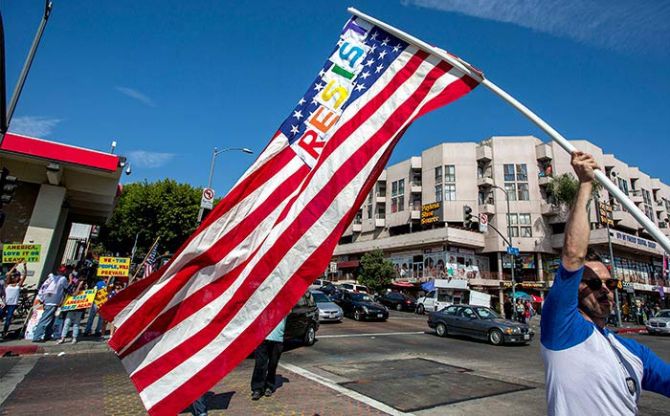
Photograph: David McNew/Getty Images
We have to be vigilant.
The 9/11 experience -- at that time I had been in America for about 7 years -- and the aftermath especially was pretty scary.
I have cousins who are older than me who are still undocumented. They have been in situations where there have been raids either in a business next door or on a friend that they used to know. That was pretty dangerous.
And a lot of those deportations that occurred were not necessarily based on any threat level; most of the people that were deported only had immigration issues that they weren't able to resolve or were out of status at that time.
With this 9/11 anniversary, it is going to be challenging -- at least for Indian Americans, at least for people who are brown.
Many people fear (a repeat of) the aftermath of 9/11, which was used to give more powers to the executive.
They are afraid that with President Trump -- he has already broken some norms -- he might break even bigger norms in the name of security.
-- Chirayu Patel, a recipient of the Obama-era Deferred Action for Childhood Arrival (DACA) programme, which Trump repealed this month.
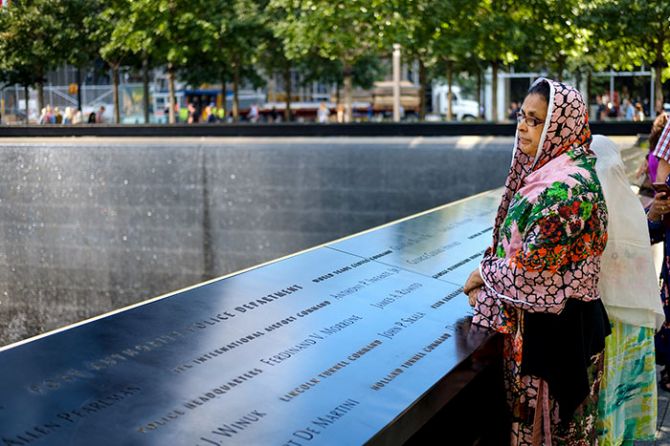
Photograph: Drew Angerer/Getty Images
In the 16 years since 9/11, our government has utiliSed a horrific atrocity as an excuse to erode the civil rights of Muslim and South Asian communities.
From profiling to spying on places of worship to banning Muslims and refugees, the current unconstitutional policies put forward by the Trump Administration build upon a multi-decade assault on American Muslims.
The xenophobia of Trump's language and policies has opened the door for a new and hostile wave of hate and violence.
Our communities want the freedom to express our identities, including our faith, without fear of discrimination, and we're asserting those rights in public policy arenas as well as through the courts.
At the National Immigration Law CentrE, we are proud to work alongside Muslim, Arab, South Asian, and immigrant communities to stand up to bigotry and demand a better and more just country for all of us.
-- Reshma Shamasunder is the deputy director, Programmes, National Immigration Law Centre in the US.
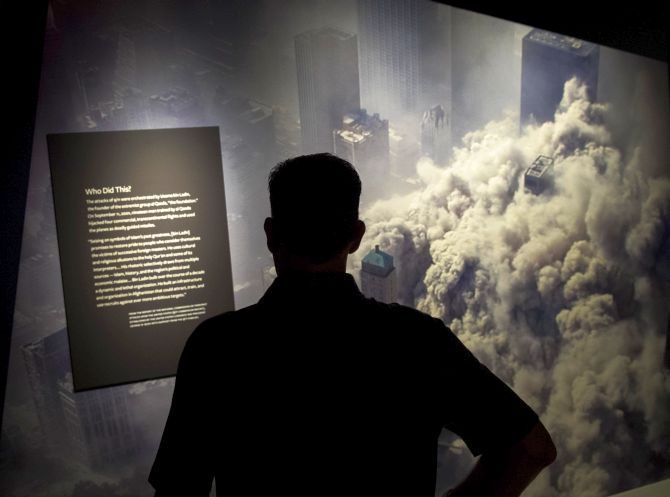
Photograph: Drew Angerer/Getty Images.
Many of us who work with Muslim, Arab, South Asian and Sikh communities have had front-row seats to events that drew national attention after 9/11, such as the Ground Zero mosque backlash, Representative Peter King's hearings on Muslim radicalization in Congress, and the 2012 massacre in Oak Creek, just to name a few.
We hold inside the stories of students facing bullying, of people being fired from their jobs because of their names or faiths, of fathers and brothers separated from family members during national security sweeps like special registration, of immigrant neighbourhoods changing overnight as surveillance and deportations became daily occurrences, and of comforting loved ones who have lost family members and friends to hate violence.
We have also had deeply personal experiences with people whom we organise with, represent, and assist, and many have become our lifelong friends.
At the same time, the organisations that we created or worked in after 9/11 were mired in perpetual rapid response.
We were always on guard because not a week passed, it seemed, without a person attacked on the street, profiled by law enforcement or thrown off a flight.
Our communities' lives and futures were at stake. As a result, we were never able to fully slow down enough to focus.
We didn't have the time and resources to proactively shape organisational culture, put the basics in place like updating databases and donor lists, build long-term relationships with partner groups, or simply move beyond being post-9/11 communities.
These seemed like luxuries that we had to push off for another day, when the crises would dissipate and there weren't storm clouds always looming ahead.
But, 16 years later, Muslim, Arab, South Asian and Sikh organisations and advocates continue to face similar challenges, especially given the current political climate.
Today, our communities are caught in the crossfire of deportations, the Muslim and refugee bans, and a barrage of hate violence.
As we mark the 16th anniversary of 9/11 and as we fortify ourselves for what is ahead, we must acknowledge the toll that the culture of crisis interventions, the cycles of rapid response, and the work of witnessing and sharing trauma are all having on our organisations, activists, and advocates...
For those of us who have been working in the shadow of 9/11 for years, this moment marks an especially daunting time.
But we draw from our own well of resiliency. That well is full of the stories of our ancestors who survived Partition, caste discrimination, riots, and forced migrations in their homelands, and restrictions on becoming citizens and owning land in America.
It is full of the stories that we ourselves can share about our communities over the past 16 years.
We may be reluctant and weary warriors, but we can course correct, if we have the vision, resources, institutional support, and time and space to heal.
We are, after all, whom we have been waiting for all this time.
-- Excerpted with permission from an essay titled 'Reckoning with trauma 16 years after' by author and activist Deepa Iyer.
Also by Deepa Iyer: Why Trump's immigration ban should worry Indians











 © 2025
© 2025